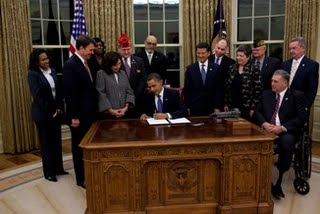
As we honor the service and sacrifice of our nation’s veterans on this Veteran’s Day, I hope you’ll join me in honoring the tens of thousands of veterans who serve our country as members of Department of Homeland Security.
DHS’ civilian workforce includes approximately 47,000 veterans, comprising 25 percent of all employees—including Deputy Secretary Jane Holl Lute—in addition to the 42,000 active duty members of the
U.S. Coast Guard.
Every day, these men and women play a critical role in our nation’s security – guarding against terrorism, securing our borders, enforcing immigration laws, preparing for and responding to disasters, and strengthening our Department’s operations.
Monday, I joined President Obama as he signed an Executive Order establishing the Veterans Employment Initiative to increase employment opportunities in the federal government and help recently hired veterans succeed in their jobs.
Engaging veterans and veterans’ organizations at the Department continues to be one of my top priorities. We want and need veterans to lend their unique skills, experience, and clear commitment to service to our mission. That’s why we have set a goal to have 50,000 veterans on-board at the Department by 2012.
To help us achieve that goal, today we launched a new website specifically for veterans –
www.dhs.gov/veterans. This one-stop-shop contains information about hiring and business opportunities for veterans, ways to get involved in community-based efforts like
Citizen Corps, and special veteran programs such as Operation Warfighter and Wounded Warrior, which provide employment opportunities for severely wounded or recovering service members to assist their transition back to the military or civilian workforce.
We’re proud to have so many veterans at DHS contributing to our mission every day. On Veterans Day and every day throughout the year, let’s continue to give thanks to veterans, both inside and outside the Department, for all they've done to serve our country.
Janet Napolitano
Labels: About the Department, veterans

 Last week, I was in Toledo, Spain, and Geneva, Switzerland, to meet with our European counterparts and aviation industry leaders on one of the Department of Homeland Security's major priorities: working with our international partners to strengthen aviation security standards following the attempted terrorist attack against Northwest Flight 253 on December 25th.
Last week, I was in Toledo, Spain, and Geneva, Switzerland, to meet with our European counterparts and aviation industry leaders on one of the Department of Homeland Security's major priorities: working with our international partners to strengthen aviation security standards following the attempted terrorist attack against Northwest Flight 253 on December 25th.

